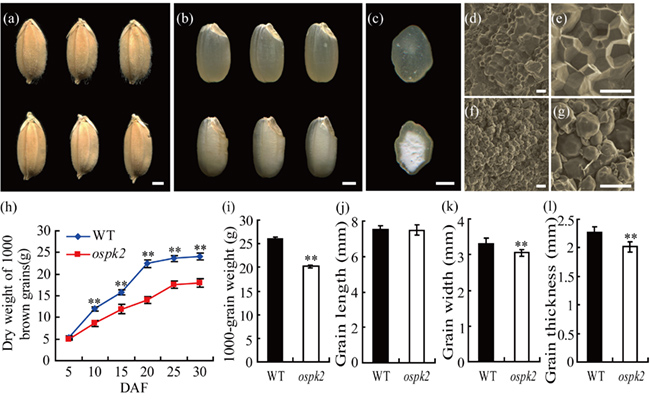






OsPK2 encodes a plastidic pyruvate kinase involved in rice endosperm starch synthesis, compound granule formation and grain filling
May 14th, 2018
Recently, a research team led by Professor Hu Peisong from China Rice Research Institute of Chinese Academy of Agricultural Sciences (CAAS) has made a great progress on new regulatory mechanism of rice starch synthesis and grain development.
Starch is the essential carbohydrate storage material in plants. The genetic basis of starch synthesis and grain development was a complex regulatory network. Although several enzymes and regulators of starch biosynthesis have been defined, the complete molecular machinery remains largely unknown. Therefore, identification and characterization of different rice endosperm defective mutants are necessary for further understanding this process in rice.
In this study, a novel rice white-core endosperm and defective grain filling mutant, ospk2, was identified. Compared to wild-type, the ospk2 mutant displays significantly lower grain weight, decreased total starch and amylose content, increased fatty acid content, and alteration of starch physicochemical properties. The normal starch compound granules were drastically reduced and more single granules filled the endosperm cells of ospk2. In addition, the seeds of ospk2 were not resistant to storage, and the germination rate of ospk2 was significantly decreased after aging. By map-based cloning, OsPK2 encodes a pyruvate kinase (PK) with PK activity, and the mutant presented reduced protein activity both in the protein product from expressed ospk2 and the crude protein extracted from tissues. OsPK2 has a constitutive expression in rice and its protein localizes in chloroplasts. OsPK2 (PKpα1) and three other putative rice plastidic isozymes, PKpα2, PKpβ1 and PKpβ2 can interact to form heteromer. Moreover, the mutation leads to obviously changed expression level of genes related to multiple metabolic (eg. starch synthesis, fatty acid synthesis, glycolysis pathway). The study further supplemented and perfected the molecular genetic mechanism of starch synthesis in rice endosperm.
PhD. student Cai Yicong and Dr. Li Sangfeng are co-first authors of this study, which is supported by the National Key Research and Development Program of China (Grant No.: 2016YFD0101801), the National Natural Science Foundation of China (Grant No.: 31471472, 31501280), and the National S&T Major Project (Grant No.: 2016ZX08001006). The study findings have been published online in Plant Biotechnology Journal (DOI: 10.1111/pbi.12923). More details can be accessed on the link below: https://onlinelibrary.wiley.com/doi/abs/10.1111/pbi.12923

· Study Reveals How the Clock Component OsLUX Regulates Rice Heading
· Scientists Further Unravelled the Underlying Mechanism of Heading Date Control in Rice
· Improving the efficiency of prime editing in rice
· A New Infection Mechanism of Ustilaginoidea virens is Revealed
· Scientists Further Reveal the Infection Mechanism of Ustilaginoidea virens
CNRRI Today
Copyright © 2014- China National Rice Research Institute